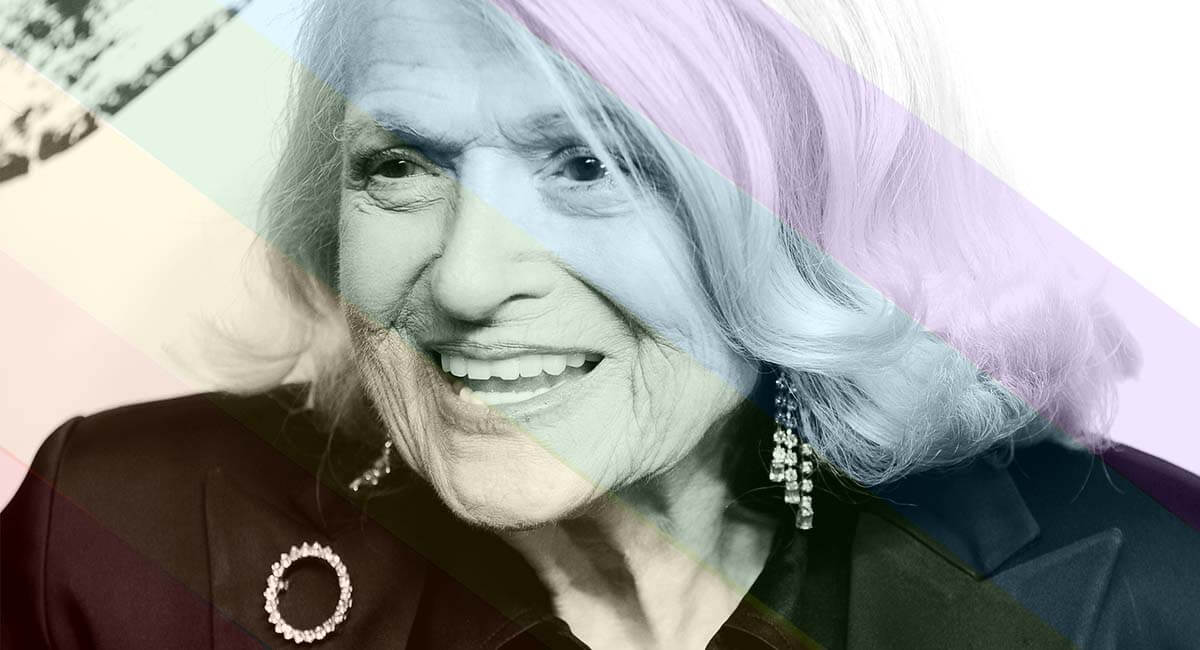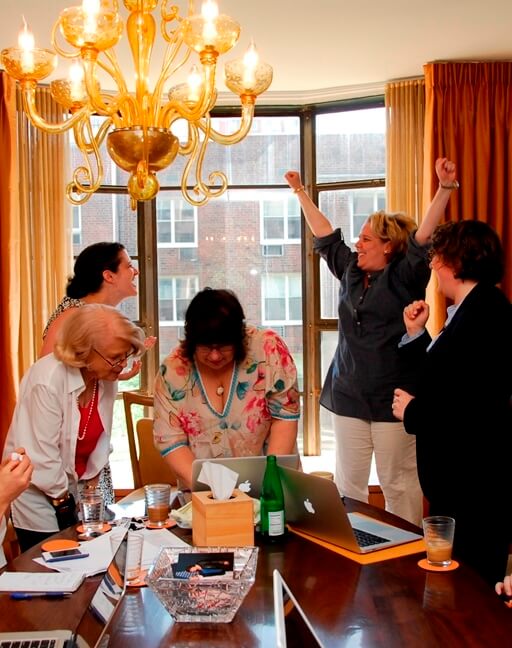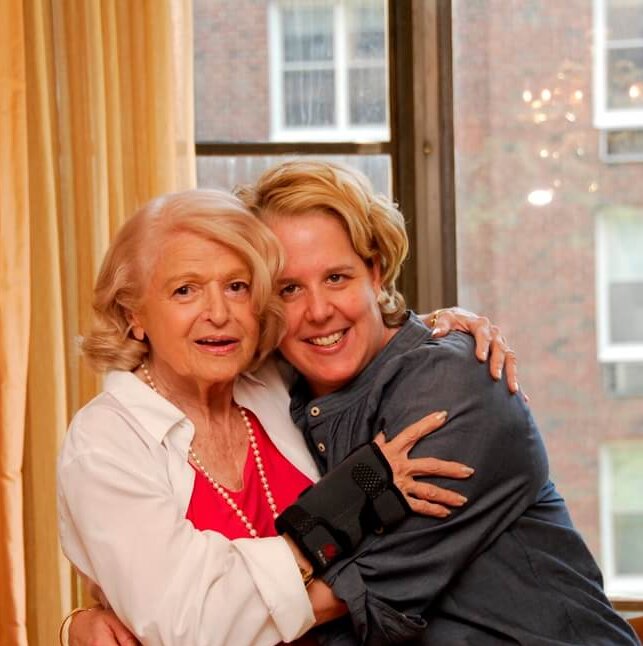LGBTQ+ people gained civil rights 10 years ago — thanks to this Jewish lesbian
Remembering Edie Windsor, who paved the way for out and proud Americans like me.

Edie Windsor on June 23, 2014 in New York City Photo by Bryan Bedder/Getty Images for Logo TV; Forward Montage
American society changed forever when the Supreme Court overturned section three of the Defense of Marriage Act in 2013, ensuring gay people were entitled to due process and equal protection under the 5th Amendment. It also made an icon out of the 83-year-old plaintiff, Edie Windsor.
Her extraordinary legal journey led to a groundbreaking ruling that permanently reshaped American society. United States v. Windsor established the legal precedent for LGBTQ+ rights, paving the way for the Supreme Court to legalize marriage equality two years later.
The Windsor decision established equality and dignity for gay people. But its ripple effects created a greater sense of freedom for everyone.
As a gay 19-year-old just coming out, Edie’s story had a profound effect on me. Learning about her case and the decades of LGBTQ+ history that preceded it, I noticed an interesting pattern: Many of the prominent LGBTQ+ leaders were Jewish.
The gay marriage movement especially had deep Jewish roots. In the mid-1980s, Evan Wolfson was one of the earliest public advocates for marriage equality, later founding the nonprofit Freedom to Marry.
Over email, Windsor’s attorney, Roberta Kaplan, shared with me how “quintessentially Jewish” this story was at its core.
Kaplan joked that at the time, “Windsor had to be the first if not only Supreme Court case handled almost entirely by a group of Jewish lesbians.”
All the key players in the case were Jewish, Kaplan notes, including her co-counsel Pam Karlan. “Edie Windsor, of course, was also Jewish…and she married another Jewish woman, Thea Spyer, whose family had left Amsterdam to escape the Holocaust.”

The love behind the lawsuit
To understand Windsor’s case, you first need to know her love story.
In 1963, Windsor met her life partner, Thea Spyer, at a Greenwich Village restaurant. Windsor was a senior systems programmer at IBM — the highest technical position at the company — back when few women worked in tech. And Spyer worked as a psychologist, at a time when being gay was classified as a mental disorder.
In 1967, Spyer proposed to Windsor, with a circular diamond brooch to conceal their engagement from the public. It was two years before the Stonewall Riots; they stayed engaged for another 40 years and married in 2007 in Toronto. This was no small feat, given that Spyer’s decades of multiple sclerosis had left her paralyzed.
When Spyer died in 2009, Windsor’s legal battle began. Even though New York recognized their marriage as valid, under DOMA, the federal government didn’t. By inheriting Spyer’s estate, Edie was forced to pay $363,000 in federal estate tax, a tax she would not have had to pay had she been married to a man.
Thus began her extraordinary legal journey.
The long road to acceptance
At the time, pursuing marriage equality was not widely accepted; in 2009, just 40% of Americans supported it. There was pushback even from LGBTQ+ organizations. “It’s the wrong time for the movement,” Windsor was told by Lambda Legal, an LGBTQ+ civil rights organization, who denied her representation.
A friend of a friend would soon introduce Edie to Roberta Kaplan, then a partner at the corporate law firm Paul, Weiss, who took her on pro bono. By focusing on Edie’s compelling story of a grieving widow seeking a tax refund, Kaplan used a powerful narrative to drive her legal strategy. In her memoir, Then Comes Marriage, Kaplan notes that focusing on Windsor’s financial injury was the right move, joking, “What do conservative right-wingers dislike even more than gay marriage? Taxes.”
It would take roughly three-and-a-half years before Kaplan and Windsor’s case made it to the Supreme Court. The path there was full of adversity, even from the LGBTQ+ community.
In May 2009, before Kaplan and Windsor filed their case, a contingent of major LGBTQ+ organizations released a statement titled, “Make Change, Not Lawsuits.” The thought was that a loss at the federal level could set the equality movement back several years. Due to Edie’s old age, she remained undeterred; she couldn’t simply wait for progress to work its way slowly through society.
Kaplan shrewdly found a workaround for this pushback by partnering with the ACLU, which was looking for a DOMA case to take on.
A protracted legal battle
Kaplan’s team filed Windsor’s complaint in November 2010. A year and a half later, the Southern District of New York heard it.
In the meantime, the Obama administration made some historic announcements in favor of gay rights. In February 2011, the Department of Justice declared it would not defend the constitutionality of DOMA. Then in May 2012, President Obama announced his support for same-sex marriage.
A month later, the Southern District of New York ruled in Windsor’s favor, sending the case to the Second Circuit Court of Appeals, which upheld the ruling in October. Two months later, the Supreme Court announced that it would hear Windsor’s case.
Kaplan said,”Windsor was about “b’tzelem Elohim,” or the concept that every human being was created in the divine image.” By 2013, the majority of American Jews agreed.
A month before the hearing, every major Jewish denomination except for Orthodoxy signed an amicus brief to the Supreme Court supporting Windsor’s case for marriage equality.
LGBTQ+ equality under the law

The Supreme Court, in a 5-4 decision, ruled in favor of Windsor. The ripple effects were felt far and wide. Almost immediately, it catalyzed a rapid transformation of the nation’s acceptance of gay people.
For decades, queer people existed on the fringes of society. Now we’re included — and often celebrated — by the mainstream. During June, Pride flags adorn nearly every storefront in major cities. For many young people, it’s even seen as cool to be gay. That’s a big leap from the way gay was routinely used as an insult just a decade ago.
Today, support for same-sex marriage is at a high of 71%. When DOMA was signed into law in 1996, that number was at 27%.
But despite all the strides in gay rights and acceptance — or perhaps because of them — there remains conservative pushback. There are nearly 500 anti-LGBTQ+ bills currently moving through state legislatures.
For Kaplan, it’s deja vu.
“All of these efforts are part of the same playbook that were used to argue in favor of DOMA,” she says. “Inherent in Jewish belief, however, is the idea that people, communities and even the law must and should change when times and ethical circumstances demand it.”
(Kaplan is suing Florida over the hotly contested “Don’t Say Gay” bill, which restricts discussion of LGBTQ+ topics in K-12 classrooms.)
From acceptance to embrace
When I think of the far-reaching impact of Windsor, it reminds me of the song Dayenu chanted during Passover, counting all the ways Jewish liberation from Egypt are enough to be grateful for.
If Windsor just provided legal equality, that would be enough. But it did so much more.
The gay version of Dayenu goes a little something like this:
If not for Windsor, there would be no Supreme Court decision legalizing marriage equality in 2015.
If not for Windsor, it would still be legal in half the country to fire someone for being gay.

If not for Windsor, we wouldn’t have elected a record number of LGBTQ+ people to Congress in 2022.
If not for Windsor, every MLB team (except the Texas Rangers) wouldn’t be holding a Pride Night this year.
If not for Windsor, we don’t get the “Pride Whopper” and all the other branded pride gimmicks that have spawned outrage and mockery.
Sure, Pride Month has become a second Christmas for brands to capitalize on. But consider the alternative: caving in to angry bigots, which is what’s happening right now to Target and Bud Light. But I’ll take rainbow capitalism if it means promoting acceptance, especially for queer youth who remain vulnerable. Who doesn’t love Rainbow Doritos?
The gift of Windsor
The gift of Windsor transcends the legal and political: It gave permission for those on the fence to hop on board in supporting LGBTQ+ equality. Windsor made gay people fully human in the eyes of the government and broader society.
In 2017, I had the privilege of meeting Edie at the Capital Pride brunch in D.C., where she was honored as the grand marshal of the parade, a week shy of turning 88.

When I got the chance to sit down with her, she already knew who I was. Her spouse, Judith, connected with me on Instagram a few months earlier.
“I hear you’ve been tweeting about me,” Edie said, an unexpectedly hilarious comment coming from her.
We only spoke for a few minutes, but she confirmed something I had been dying to know. We shared an uncanny personal connection: Edie was my late grandfather’s boss at IBM some 50 years ago.
I showed her a young picture of him in his IBM headshot, and her jaw dropped. After we were done schmoozing, we took a photo. I was just about walking on air. Edie had that type of glow that has still stayed with me ever since.
Three months later, Edie died. Her spirit certainly carried on, in me and other out and proud Americans.
Edie Windsor transcended politics. Her aura was so luminous that she had the power to change the hearts of people who didn’t even know her personally.
Her story debunked every myth that demeaned gay people.
Her life and legacy is the gift that keeps on giving.
Listen to That Jewish News Show, a smart and thoughtful look at the week in Jewish news from the journalists at the Forward, now available on Apple and Spotify:























